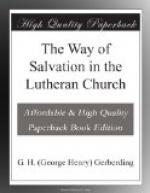If there were one Scripture character who, if such a thing were possible, would have attained to sinless perfection, that one would certainly have been the greatest of all the apostles, Paul. He labored more than they all; he suffered more than they all; he went deeper into the mysteries of redemption than they all. He was not only permitted to look into heaven, as the beloved John, but he “was caught up into the third heaven, and heard words that it was not lawful for him to utter” on this sinful earth. Oh, what purifying through suffering! What visions and revelations! What experience of Grace! And yet this burnished vessel never professed sinless perfection. Indeed, he never ceased to mourn and lament the sinfulness and imperfection of his own heart, and called himself the chief of sinners. He does indeed speak of perfection. Hear what he says, Phil. iii. 12, 13, 14: “Not as though I had already attained, either were already perfect; but I follow after, if that I may apprehend that for which also I am apprehended of Christ Jesus. Brethren, I count not myself to have apprehended; but this one thing I do, forgetting those things that are behind, and reaching forward unto those things which are before, I press toward the mark, for the prize of the high calling of God in Christ Jesus.”
The saints on earth, then, are not sinless ones. The Bible does indeed speak of those born of God sinning not, not committing sin, etc. But this can only mean that they do not wilfully sin. They do not intentionally live in habits of sin. Their sins are sins of weakness and not sins of malice. They repent of them, mourn over them, and strive against them. They constantly pray, “Forgive us our trespasses as we forgive them that trespass against us.” But their heart-purity and sanctification are only relative.
Sanctification is gradual and progressive. We have seen that Paul thus expressed himself. He was constantly “following after,” “reaching forth,” “pressing toward” the mark. He exhorts the Corinthians, 2 Cor. vii. 1, to be “perfecting holiness in the fear of the Lord,” and again, 2 Cor. iii. 18, to be “changed into the same image from glory to glory.” He tells them in chapter iv. 16 that “the inward man is renewed day by day.” He exhorts the saints or believers, again and again, “to grow,” “to increase,” “to abound yet more and more.”
Growth is the law of the kingdom of nature. And the same God operates in the kingdom of Grace, and, indeed, much after the same order. Our Saviour, therefore, so often compares the kingdom of God, or the kingdom of Grace, to growth from a seed, where it is “first the blade, then the ear, and then the full corn in the ear,” Mark iv. 26-29. In harmony with all this Paul calls those who have but lately become believers, “babes in Christ.” He tells them they must be “fed with milk as babes,” etc. Therefore, it is quite natural that we find so many exhortations to grow in Grace and in knowledge.




